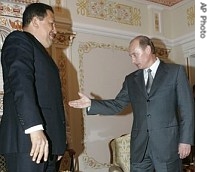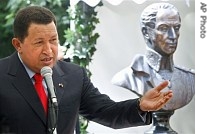2007年VOA标准英语-Chavez, Putin Meet in Russia
时间:2019-01-13 作者:英语课 分类:2007年VOA标准英语(六月)
Moscow
28 June 2007
Venezuela's President Hugo Chavez is in Moscow for discussions with Russian President Vladimir Putin about a possible arms deal and expanded economic ties between the two countries. VOA Correspondent Peter Fedynsky reports from the Russian capital.

Russian President Vladimir Putin, right, greets Venezuelan President Hugo Chavez during their meeting in the Novo-Ogaryovo residence outside Moscow, 28 June 2007
President Hugo Chavez met his counterpart, Vladimir Putin, Thursday evening at an informal dinner at the Russian leader's country home near Moscow. But Russian news reports throughout the day focused on the opening of a Latin American cultural center in Moscow, where Mr. Chavez spoke 1 for about an hour. Mr. Putin indicated that he followed the Venezuelan's appearance like most Russians, on television.
President Putin says he was able to watch televised news reports and noted 2 that the new center will be a place where Russians can familiarize themselves with Latin American culture.
By scheduling Mr. Chavez so late in the day, Mr. Putin prompted speculation 3 in Moscow that he downplayed the meeting because he does not want to be seen aggravating 4 his already chilly 5 ties with the United States. Washington considers Mr. Chavez to be a destabilizing element in Latin America. President Bush has invited the Russian leader for a visit this weekend at his family home in Kennebunkport, Maine to discuss ways of improving bilateral 6 relations.
The United States is also concerned about Venezuelan arms purchases. Mr. Chavez's Moscow agenda includes the possible purchase of Russian diesel-electric submarines, armed with missiles. He is also interested in buying the Russian TOR-1 missile defense 7 system. Last year, Mr. Chavez signed a deal with the Kremlin to purchase $3 billion worth of weapons, including helicopters, fighter planes and small arms.
The Venezuelan leader said on Thursday that he does not rule out the development of nuclear energy in his country. Mr. Chavez also said American troops should leave Iraq, and that Iran has a right to nuclear technology.

Hugo Chavez speaks while opening Venezuela's cultural center in Moscow, 28 June 2007
Mr. Chavez says that Iran has the right to a peaceful atomic energy industry because it is a sovereign state.
Russian and Venezuela, both major exporters of energy, are also discussing expanded commerce. Their bilateral trade, last year, amounted to only $90 million.
On Saturday, the Venezuelan leader will be President Putin's guest at a horse race in the southern city of Rostov-on-Don. However, despite signs of closer relations, Russian lawmakers voted against allowing Mr. Chavez to address them in a full session of the country's lower house of Parliament.
Mr. Chavez has plans for more weapons deals with neighboring Belarus, where he flies after his visit to Russia. He then continues to Iran.
- They sourced the spoke nuts from our company.他们的轮辐螺帽是从我们公司获得的。
- The spokes of a wheel are the bars that connect the outer ring to the centre.辐条是轮子上连接外圈与中心的条棒。
- The local hotel is noted for its good table.当地的那家酒店以餐食精美而著称。
- Jim is noted for arriving late for work.吉姆上班迟到出了名。
- Her mind is occupied with speculation.她的头脑忙于思考。
- There is widespread speculation that he is going to resign.人们普遍推测他要辞职。
- How aggravating to be interrupted! 被打扰,多令人生气呀!
- Diesel exhaust is particularly aggravating to many susceptible individuals. 许多体质敏感的人尤其反感柴油废气。
- I feel chilly without a coat.我由于没有穿大衣而感到凉飕飕的。
- I grew chilly when the fire went out.炉火熄灭后,寒气逼人。
- They have been negotiating a bilateral trade deal.他们一直在商谈一项双边贸易协定。
- There was a wide gap between the views of the two statesmen on the bilateral cooperation.对双方合作的问题,两位政治家各自所持的看法差距甚大。